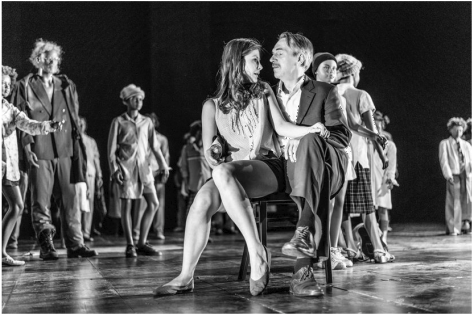Although I am getting better and better at understanding quickly spoken German, I still always miss words at the theater. So when I saw that the Kammerspiele was performing Schande (Disgrace) with English supertitles. I was excited by the prospect of a show that would be easy to follow. I shouldn’t have been, for two reasons: (1) it’s an awful play, and (2) the supertitle operator seemed to be drunk or sleeping for large sections of it.
I think my second complaint is self-explanatory, so let’s dicuss the first. I haven’t read J.M. Coetzee’s novel on which the play is based, so I don’t know if it’s any good. But I can tell you definitively that it doesn’t work as a play. (German reviewers seem to disagree with me on this one, but they’re free to be wrong.) There is no dramatic arc. Exciting things occasionally happen (far too rarely), but there’s no clear rhythym to them and no clear climax. The adaptor Josse de Pauw’s choice to make the scenes unchronological just exacerbates the problem: where does the story begin and end? Actually, it keeps feeling like the play should end, but it drags on and on and on. Perhaps this sense of endless tedium is partially due to the ill-advised decision to stage a two-hour show without an intermission.

The events portrayed ought to be exciting, though they somehow are not. The play opens with a sex scandal (Professor Lurie is dismissed in disgrace for seducing and raping a vulnerable student) and includes a violent attack on the professor and his daughter. It deals with race relations and political change in South Africa. (It’s also pretty racist—the agents of violence and chaos are invariably black, and there’s a hint that Laurie’s daughter’s black business partner arranged for her to be raped as part of a scheme to take control of the business—but perhaps that’s because most events are presented through the eyes of a suspicious, middle-class, white man during a period of extreme racial turmoil. It’s disturbing nonetheless.)
I have ambivalent feelings about Luk Perceval’s staging. On one hand, the mannequins scattered around the stage are a cool and eerie representation of both the stuggling mixed-race society and the witnesses of Professor Lurie’s disgrace. On the other hand, the actors can’t really do anything with them, and much of the action ends up being very static. The lack of props and set also means the actors’ gestures often directly contradict their words. But perhaps the strangest staging choice is having some actors speak English and some speak German. There are whole dialogues where the two participants are speaking different languages. I can’t remember whether the language differences are split along racial lines, though I wouldn’t be surprised if they are. In any case, it’s bizarre to hear (and also rather implausible—English and German aren’t exactly mutually comprehensible).

Overall, the excitement of seeing something presented for English-speaking audiences wore off pretty quick. It would have been nice, if only they had picked a better play.